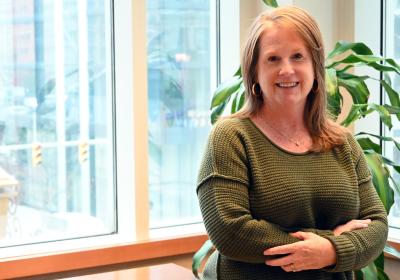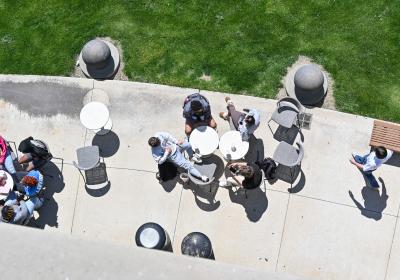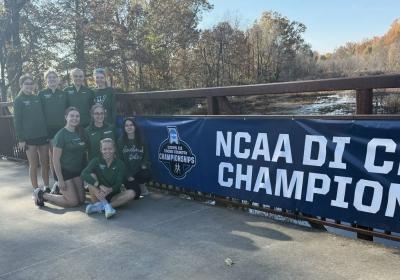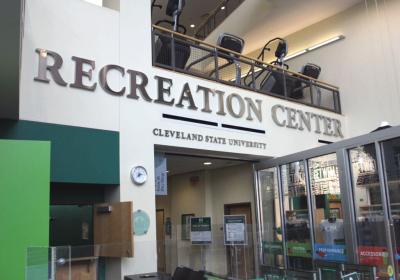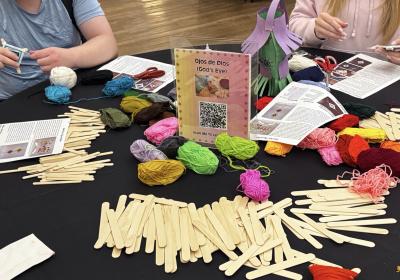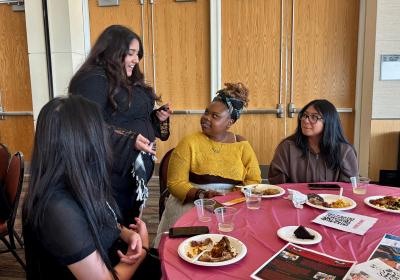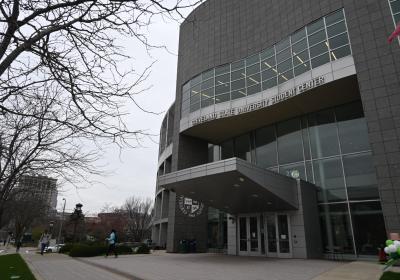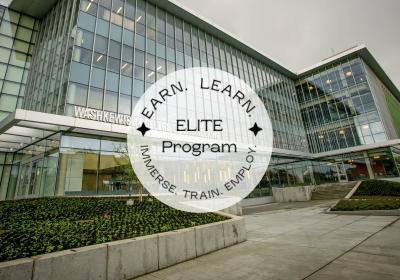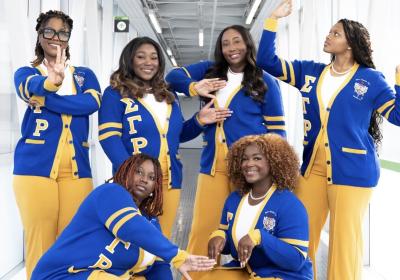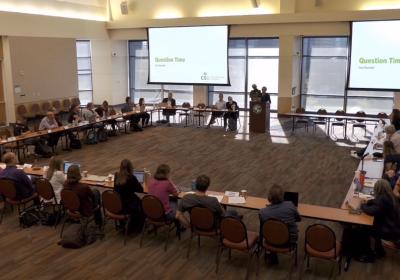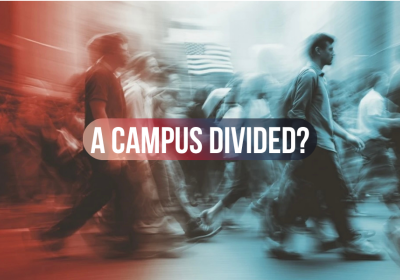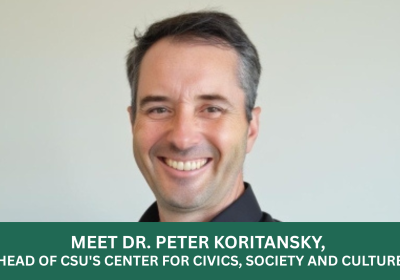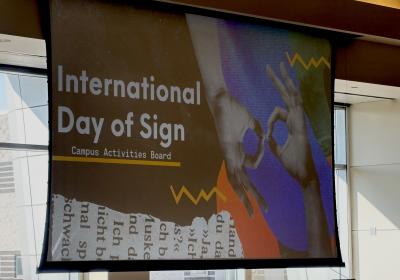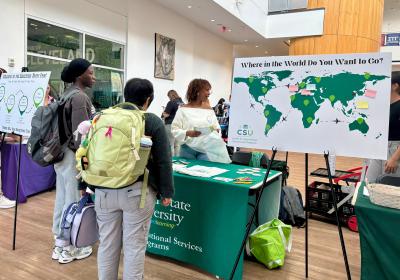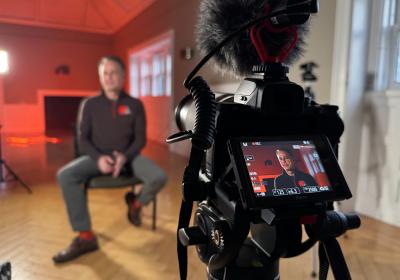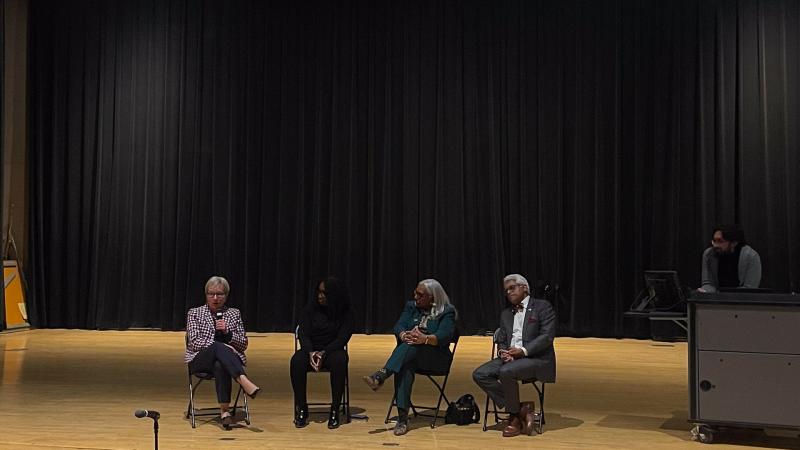
“What does it all mean?” SGA listening session provides some answers
Cleveland State University President Dr. Laura Bloomberg was joined by CSU cabinet leaders on Tuesday at listening sessions aimed at clarifying for the community what recent state and federal higher education policy changes and executive orders might mean for the university.
CSU's Student Government Association organized the sessions, one in the morning and one in the afternoon, which SGA President Justin Samsa hosted. Attendees were invited to ask the university's senior leadership questions or share personal experiences and comments.**
President Bloomberg began the afternoon session with remarks about higher education regulations the Ohio legislature is considering.
“Whether you think what is happening is good or not, it feels a bit like whiplash sometimes," Bloomberg said. "If it feels that way to those of us who are full-time focused on administration, I’m sure it feels that way to students. I’m sorry about that and I’m sorry ahead of time for answers that we don’t have."
Senate Bill 1: Advance Ohio Higher Education Act
Top of the agenda was SB1, a bill almost certain to become law in Ohio, which threatens inclusion-based initiatives and faculty control of their teaching. Republican State Senator Jerry Cirino sponsored the bill.
“As a general rule, almost a principle, we are not going to act precipitously,” Bloomberg said. “We are in compliance with the current law, and we will stay that way until forces suggest that we must change.”
Bloomberg warned against preemptive compliance as the bill's supporters seek to roll back the gains of decades of making education equally and fully accessible to all.
“You will read about institutions who did make preemptive decisions, and now they’re rolling back those decisions because they didn’t have to make them,” Bloomberg said. “You read about people going kind of maybe further than they needed to go on bathroom signage and are changing that. We don’t want to be in that situation.”
International Students
Cleveland State has a vibrant and growing international student body. But many of its members now feel threatened, particularly by the anti-immigration rhetoric and actions of President Donald Trump's administration.
When asked how international students should navigate travel bans and threats to their security in the U.S., Provost and Senior Vice President Dr. Nigamanth Sridhar encouraged student visa holders to follow advice and instructions from the Center for International Services Program (CISP).
“Sometimes their advice may sound overly conservative, but understand that their (CISP's) primary role is to protect you as a student and protect your presence in this country,” Sridhar said. “If it’s a short term hassle to ensure long term staying out of trouble, that’s a better thing to do.”
Dr. Sridhar also said that the university plans to send out targeted communications to individual students depending on which country they are from with advice regarding widely expected travel bans.
Immigration and Customs Enforcement
Immigration and Customs Enforcement (ICE) is spearheading the federal government's move against immigrants and foreign students and is already attempting to deport students targeted by the Trump administration.
Bloomberg asked Sonali Wilson, J.D., Vice President of Legal Affairs and Compliance, to address what students should do if ICE appears on campus.
“If ICE or any of the immigration agencies or officers show up, immediately contact my office, which is the Office of General Counsel," Wilson said. "They have to have a legitimate subpoena or warrant in order to interact with a student and cart them away.” Wilson's office is on the 3rd floor of the Parker Hannifin Administration Center at 2300 Euclid Ave.
Dr. Wilson also encouraged students to visit the Legal Aid website, which has information on attorneys who can represent students and on how to handle immigration enforcement coming to someone's home.
LGBTQ+ Community
Another at-risk group at CSU is the LGBTQ+ community which has already seen the Trump administration and State of Ohio curtail gender rights.
When asked about the LGBTQ+ community on campus, Dr. Wilson said that she doesn’t expect that LGBTQ+ organizations or any other student organizations based on any affinity will be affected by SB1. However, she did not rule out attacks from other directions.
“But then, we don’t know that just because it’s not in SB1 doesn’t mean that it couldn’t get amended or that something else could come about that could affect that,” Wilson said. “Right now, we’re not seeing that as a concern.”
When asked about faculty members and the university administration acknowledging and respecting students' chosen pronouns as well as all gender bathrooms, Dr. Bloomberg offered a heartfelt apology to students who feel that their identity may be at risk.
“I’m so sorry that you even need to ask that," Bloomberg said. "I just want to say that, that’s just from my heart. That’s not from the president of the university, that’s from Laura, saying I’m really damn sorry.”
In November 2024, Ohio Gov. Mike DeWine signed into law Senate Bill 104 designating all restrooms, locker rooms, changing rooms and showers for the exclusive use of males or females only, based on sex at birth. The bill was sponsored by Sen. Cirino, who also sponsored SB1.
SB104, which Republican Sen. Andrew Brenner co-sponsored with Cirino, in effect erases the identity of anybody who doesn't fit a biology-based definition of identity, by reducing identity to biology, which is not gender.
President Bloomberg said that the university has complied with the legislation, but offered an explanation which shed light on the difficulty of the decision.
“Our mission is to serve students. I don’t know as an educator how to seek excellence without acknowledging people’s identities,” Bloomberg said. “People don’t learn when they don’t feel they belong. In my mind, what we must do is acknowledge a learner’s identity so that we can achieve our mission, serve our students and you can graduate and follow the paths you want in your adult life.”
Diversity, Equity and Inclusion
Derek Williams, President for the Cleveland State Association of Black Journalists, asked the panel if his organization, as well as other student organizations based in diversity, are at risk from SB1.
Wilson summarized SB1, the Dear Colleague letter which critics point out turns racism on its head, and frequently asked questions on the topic, saying the university will allow student organizations to exist as long as they are open to all and not discriminatory.
“Targeting programs because of race, to me, that’s discriminatory,” Wilson said. “But anyway, that’s for the courts to decide in terms of SB1. SB1 really doesn’t address student organizations.”
Bloomberg added to Wilson’s statements, saying that there is no threat that the university can see at this time.
“We’ll move forward, as is,” Bloomberg said. “When we learn more, we will do more.”
In terms of the CSU curriculum that focuses upon diversity, such as women and gender studies majors and minors, Provost Sridhar assured students that these programs will continue to be offered.
“Whether it’s the executive orders from the federal government or SB1, there’s nothing in the language that we can read that has anything to do with curriculum,” Sridhar said. “What it does say is that if you are teaching a class on feminism, for example, you can’t prevent certain kinds of conversations from occurring. The whole point of a feminism class is to have all kinds of conversations on feminism right? So I don’t see that as a threat or a worry.”
CSU faculty buyouts and financial status
Bloomberg commented on the financial status of the campus, mentioning it was a hard year due to expenses outpacing the university’s revenue.
“In five years it could balloon to a $40 million deficit. That’s different than saying we had a $40 million deficit. We didn’t, we had about an $11 million, give or take, deficit, which we have closed,” Bloomberg said.
The president mentioned that the university plans to go to their board with a balanced budget for them to approve at the end of this fiscal year.
“The hard news is that it’s painful to do that. There were programs that were put on pause as we were carefully looking at ‘can we do all the things that we were going to do?’” Bloomberg said. “Those are painful things.”
Regarding faculty buyouts, Bloomberg said that to her knowledge the university never fired a higher paid faculty member and then hired a lower paid faculty member into the same position.
“We had to get smaller, that was painful,” Bloomberg said. “But we’ve done that work, and we are on stable financial footing.”
Sridhar clarified that the university offered faculty members a voluntary buyout, due to the 10% faculty member reduction needed based on the university’s analysis. He added that more faculty took the buyout than the 10% threshold, which gave CSU an opportunity to hire new faculty.
“We had the opportunity to be more strategic in terms of where we hire,” Sridhar said, highlighting that the first beneficiaries were the health, law and engineering colleges.
Student Experience Project
The panel explained the Student Experience Project, which Sridhar said has about 90 faculty members participating in this semester.
Sridhar explained that the Student Experience Project is for faculty members to come together once a week to talk about their own teaching experiences with the goal of creating a more welcoming environment in CSU classrooms.
“The goal is to improve the student experience,” Sridhar said. “Not by asking students to behave in a different way, but by asking adults, the faculty, to behave differently and to create more welcoming environments.”
Vice President of Student Belonging and Success Tachelle Banks, Ph.D., finished the session by commenting on the university’s commitment to centering students, and ensuring student success.
“I can say with complete certainty of the leaders on the stage, our collective commitment to you is to engage in authentic teaching and learning and support for you,” Dr. Banks said. “So we may not have the answers now, we’ll arrive today. We’ll arrive at that our commitment is to figure out how we traverse this together.”
** Editor's note: The SGA hosted two listening sessions, one in the morning and one in the afternoon of March 18. This article covers the topics and answers from the afternoon session.




